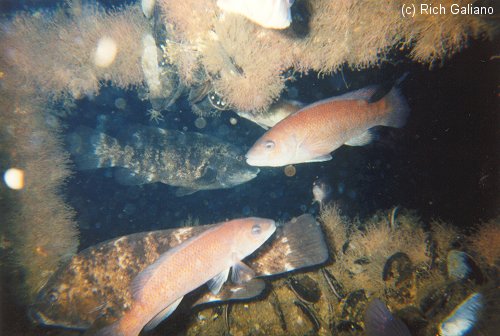Local Diving Conditions
Diving in the Caribbean is wonderful. The weather and the viz are practically guaranteed, and the reefs will be right there where you left them last time. You can plan a whole vacation months in advance, safe in the assumption that it will almost certainly work out, or at least it won't be the weather that does you in.
If it were only like that here. Diving in New Jersey can be a very hit-and-miss proposition. There really is a lot of great diving here, but nothing in the North Atlantic is guaranteed. A week's worth of bad weather, or a month, or a whole summer of sunshine and glass seas, there's just no telling.
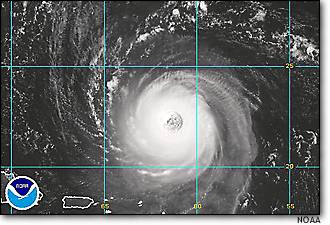
The diving season in New Jersey begins in June for most of us. Hardy souls in drysuits will dive all year long, but with a good 7mm wetsuit, early June is still chilly. By late July the ocean has warmed up nicely, and it keeps getting warmer through September and doesn't really get cold again until October or even later.
So the peak dive season is June through November, right? Well, not quite. Early August starts hurricane season, and by late August it is in full swing. A couple of good storms and everything is so roiled up that there is almost no point in trying to dive anymore. That's not to say that there can't be a good year with no hurricanes. Barring storms, with a drysuit you could reasonably expect to dive from late April to early December.
More: The Season ...
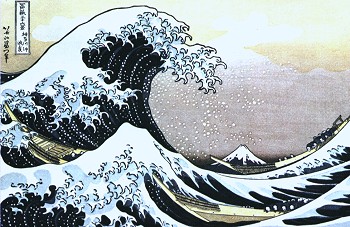
Winds are named for the direction they blow from, not to. Therefore, a west wind blows out of the west, toward the east.
Waves are created by wind. The factors in the mechanics of wave creation are wind speed and direction and fetch. Fetch is the distance over which the wind acts on the water. The longer the fetch, the greater the wave-building action. Similarly, the greater the wind speed, the greater the wave-building action.
More: Winds & Waves ...
The North Atlantic is extremely changeable. The aspect that most governs where and when you will ( or even can ) dive is the wave height or the surf. If the surf is pounding on the shore, then it is a good bet the inlet will not be a good dive, let alone the beach. A big surf will even ruin conditions way up the river, say at the Railroad Bridge.
The wave heights on the open ocean will dictate your boat diving. In 1-3 foot seas, the boats can go just about anywhere, all the way out to even the farthest wrecks. In 3-5 foot seas, some boats will do that anyway, but don't count on it. Instead, a closer-in site will be your most likely destination, although perhaps as far as the Pinta or the Mohawk. In 5-6 foot seas you are going to the Delaware, and you'll wish you'd stayed home. Bigger waves than that, and you shouldn't even leave port, although some captains will try. While this may seem like admirable determination on their part ( more like irresponsible greed in some cases! ) you're better off just not going.
More: From Day to Day ...

In a coastal area like New Jersey, the dominant winds are created by differential warming of the land and sea by the sun. Air warms over the hotter land and rises, and cool air from over the sea sweeps in underneath to replace it. These on-shore winds build over the course of the day, and so the waves they induce also build over the course of the day, then die down overnight.
I have found that the best diving conditions in New Jersey are either early morning or night. This is when the daily cycle of wave heights is at its lowest. Fortunately, the time restrictions on the inlets and beaches usually coincide with this.
More: Daily Weather Patterns ...
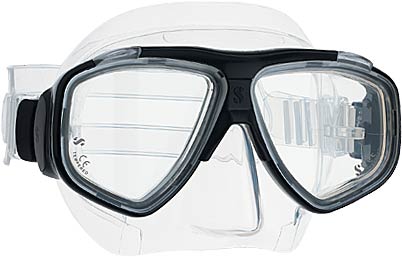
I have found no correlation between good visibility and anything else at all. Calm seas certainly don't hurt, but the worst visibility I have ever been in was with a 1-foot surf on the beach. There is however a very good correlation between bad visibility and storms, which is why a single hurricane can end the season.
Other factors which influence visibility are: algae blooms, spawning seasons of some invertebrates, which can fill the water with tiny swimmers, jellyfish ( yes, so many you can't see through them, luckily they don't sting, ) other divers churning up the bottom, and just plain gunk in the water. I don't know how to predict most of these, except to say that if you dive a lot, sooner or later you will see some good visibility. Sometimes in the ocean, the visibility will be different in different depth layers. I have seen the viz go from 3 ft on the way down the anchor line to 20 ft on the wreck.
More: Visibility ...
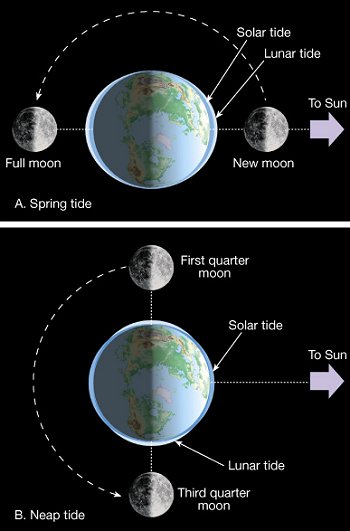
Shore diving is very much dependant on the tide. Tidal inlets and rivers will flow with the tide, such that a river may even flow upstream for a time when the tide is incoming. Normal river currents are far too strong to swim against, and will simply sweep away a loaded diver. Many inlets have time restrictions for divers, so you will have to take the local laws and the tide tables into account to work out a good dive time.
However, there are two times when the currents drop to near zero. Those are dead high tide, and dead low tide. Of the two, dead high tide is usually better, simply because there is more water, and it is cleaner ocean water rather than silty river water. You will get about a half-hour window on either side of dead high tide during which you can either drift in the weak current or swim against it. After that, you'd better get out.
More: Tides ...
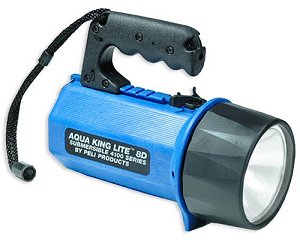
Unlike ( or just like ) the Caribbean, diving in New Jersey is actually better at night in many ways. That's obviously not true if you are out to survey a shipwreck, but for inlet diving, there is no comparison. During the day, the day critters will be wide awake, and you won't be able to get near them, while the night critters will be down in their holes where you'll never see them.
At night, you can go right up to the sleeping day critters and pinch them, even the fish. Some even seem mesmerized by your light, which will also draw in many small invertebrates by itself. Meanwhile, the night critters will be out prowling around, including the king of all night critters, the lobster. And if you shut off the light and wave your hands vigorously, the bioluminescents will put on a show for you.
More: Night Diving ...
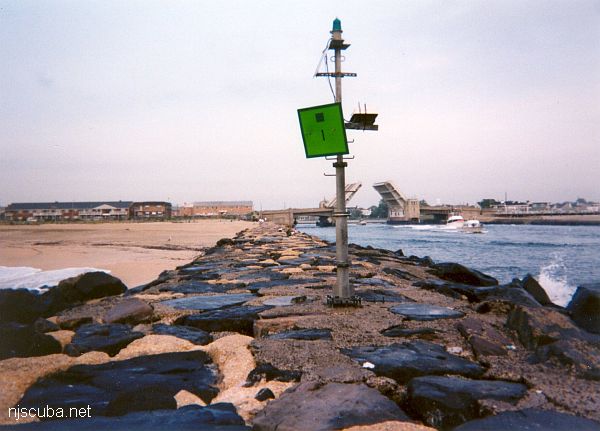
If you are used to falling off a boat into the clear, warm, sunny Caribbean, and then being helped back into the boat after a nice drift, then a Jersey inlet dive may be something of a shock to you. Inlet diving requires more confidence and diving ability than almost any other kind of recreational diving.
More: Inlet & Beach Diving ...
Dive boat operations in the Northeast are significantly different from those you may be used to in the tropics. For this discussion, "Northeast" may be taken to mean any place north of Florida, or south at least to North Carolina.
The typical going rate for boat diving in New Jersey is about $65 for a one-tank excursion, $90-100 for a two-tank excursion. With recent fuel prices, you can expect a small surcharge as well. Longer, deeper, or special trips may cost more. A non-refundable deposit or credit card number is generally required to make the reservation. Once onboard, the crew will do all they can to make your trip a good one, so don't forget that it is customary to leave a tip for them as well - at least $5-$10, more if one of them did something special, like retrieve what you dropped overboard, or save your life. Tips go to the chief mate, not the captain.
More: Boat Diving ...
Seasickness is the bane of all scuba divers. Here are a number of preventatives:
Chinese Medicine - pressure points in the wrist that are supposed to relieve the effects of seasickness. I don't believe it.
Dramamine - to be effective, this must be taken the night before, as well as again in the morning. It is not effective on all people, and some actually get worse. There is no harm in doubling the dose if you are very worried.
More: Seasickness ...
I'm from [ Ohio, Florida, Michigan, California, Spain, Brazil, etc ] and will be vacationing in New Jersey and would like to go diving ...
I get this inquiry all the time. Diving here, compared to most vacation destinations, is cold, dark, deep, strenuous, and difficult. Chances are, if you already own all the cold water gear, and dive with it where you live, then you will be ok here. I'm talking about folks from Canada, New England, the UK, and Scandinavia, and similar places where cold-water ocean diving is practiced. On the other hand, doing a few cold-water dives in a quarry in Ohio ( or wherever ) is in no way qualification for the North Atlantic.
More: Vacationers ...
So you’re thinking about trying scuba diving, but you’re not sure where to start. It is actually not difficult to get your entry-level certification to dive, easier than getting a driver’s license. Look in the Yellow Pages or in the Directories section of this website for a shop near you, or inquire at the local college, university, or YMCA, which may run classes that are open to the public.
More: Dive Training ...

Ocean waves are created by wind ( in unique instances, waves may also be created by earthquake, landslide, or other major disturbance, but that does not concern us here. ) The factors in the mechanics of wave creation are wind speed and duration, and fetch.
Fetch is the distance over which the wind acts on the water. The longer the fetch, the greater the wave-building action. Similarly, the greater the wind speed, the greater the wave-building action. Winds are named for the direction they blow from, not to. Therefore, a west wind blows out of the west, toward the east. Predicting wave heights based on wind conditions is even today extremely imprecise - the weather service still gets it wrong about half the time.
More: Wind, Waves & Weather ...


